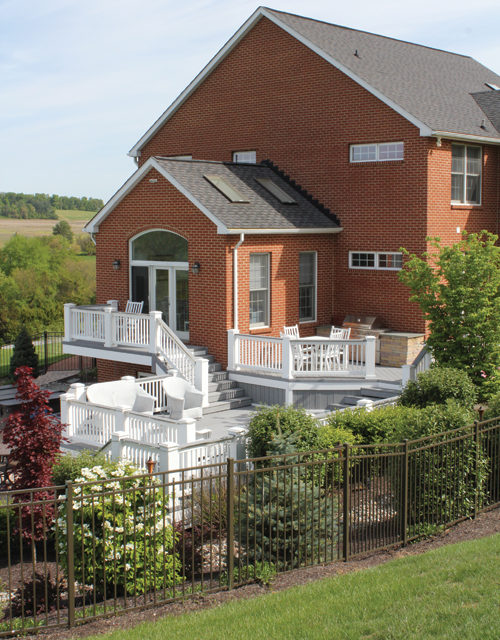
Home and Deckworks of Westminster designed and built this multi-leveled deck for a homeowner in Westminster.
Written By Scott Braden
Are you thinking of adding a deck onto your house? Most realtors and contractors agree that it could add value to your home. But there is no question that it must be done right.
Neil Forthman of Cedarbrook Deck & Patio, of Union Bridge, and his business partner, Mike Arneson, have been in the deck industry for approximately 15 years each. David Bittner of Westminster’s Home and Deckworks, Inc. started his deck-building company 25 years ago. All like being able to offer beautiful, high quality decks that their customers can enjoy for years to come.
Bittner feels that deck-building an art form because it comes after many years of experience and knowing what to design.
“Everyone’s backyard landscape is different and unique,” said Bittner, “and you need to know what will work and what will not.”
And when it comes time to transform the art form into something that is commercially viable, Forthman said, “Not only do decks offer one of the highest returns on investment as a home improvement, they are a place to come home to, unwind, and entertain outdoors.”
Bittner agreed. “[A deck] enhances the square-footage of a residence,” he said, “and if designed correctly, it will provide many years of entertainment. The attraction is to make the backyard of your home comfortable and inviting. The most important part of designing decks is to make it appear that it is simply an extension of the home.”
But what about actually building the deck? What should homeowners consider when choosing and working with a contractor?
“It’s very important to work with a deck specialty contractor,” said Forthman. “We know the products inside and out. And always deal with a licensed contractor who carries the proper liability insurance.
“I have also noticed that companies that may have specialized in other types of home improvement are now offering decks as a means to enhance their incomes. My experience has been that a good majority of these companies don’t employ true deck craftsmen, nor do they know the latest trends in quality decking products.”
“Customers need to feel comfortable with their contractor,” said Bittner. “I personally build all my structures. It is important for the consumer to know who is actually building the structure. Ask the contractor to provide images of his previous work and a list of references that you can contact to get some feedback on his work. Also check references, the Better Business Bureau, and make sure [potential contractors] are licensed with the Maryland Home Improvement Commission.”
After you have found someone who can be trusted to build a deck, what are the different varieties of decks that can be purchased, as well as the costs associated with them?
“There are a wide variety of wood and composite/PVC products on the market,” said Forthman. “Each product has different price points. Most wood decks in this area are some type of pressure-treated pine. There are natural wood upgrades such as cedar, mahogany and ipe’ [a South-Central American wood, pronounced, ‘ee-pay’] to name a few.
“Most of our customers seem to prefer the lower maintenance products such as the composite/PVC products. It is crucial to understand that not all composite/PVC material performs the same. We generally stay away from standard composite decking as [no matter the manufacturer] because there are inherent traits that are not so appealing such as staining, fading, scratching, and mold and mildew issues.
“Technology has changed greatly over the years and there are some appealing decking and railing options on the market. A good deck specialist will be able to show and explain the differences. Generally speaking, expect to pay 50 to 70 percent more for a composite/PVC deck with railing, than pressure-treated pine. In the long run, if you factor in the maintenance costs associated with a wood deck, composite/PVC is probably the way to go.”
Bittner pointed out that pressure-treated pine runs approximately $16 to $22 a square foot, cedar runs $20 to $25 a square foot, composite [maintenance free] is about $25 to $30 a square foot, and plastic maintenance-free runs about $30 to $40 a square foot.
“Prices depend on design, how high off the ground [the deck is], and what grade of materials the customer chooses,” said Bittner.

